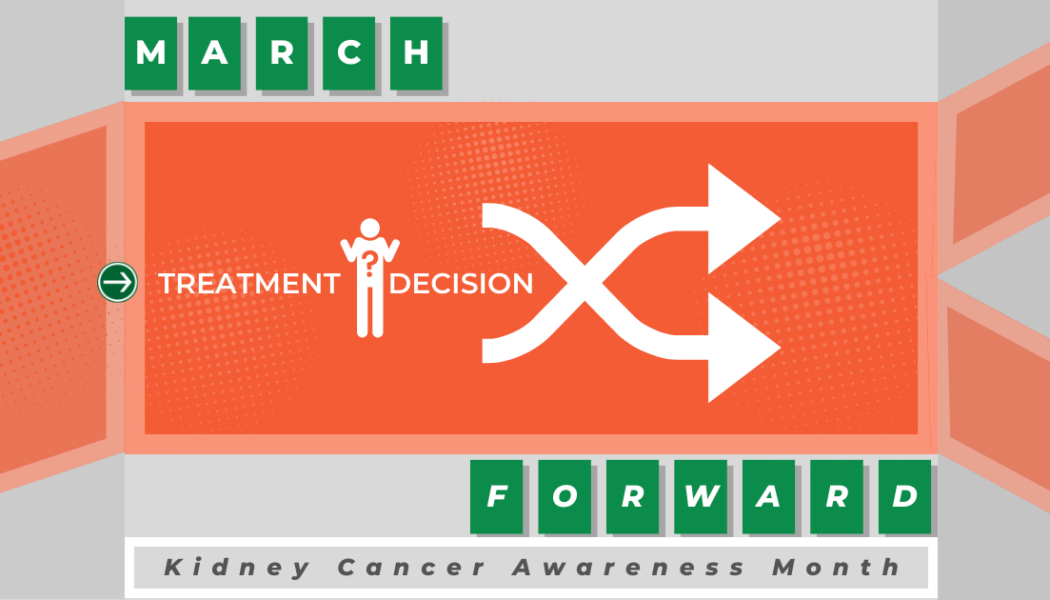Stage 1 turns out to be Stage 3
You are home recovering from surgery when your pathology report arrives in your medical portal. What your doctor thought was a small, stage 1 renal cell carcinoma was actually a stage 3, grade 2, renal cell carcinoma. Even though the mass was small – less than 5 cm – it invaded the segmented veins – which means it is now stage 3.
You don’t fully understand what it all means – but it seems like a pretty big difference from where things stood prior to surgery, and you are feeling blindsided. Having stage 3 disease means that you are eligible for “adjuvant therapy.” Adjuvant therapy is systemic treatment that is given to help prevent or reduce your risk of recurrence.
Adjuvant Treatment Decision Making
During your follow-up appointment, the doctor walks you through an on-line calculator that shows your “recurrence risk” – but also tries to reassure you that your risk is probably lower than what the calculator really is saying. You are surprised to hear that the therapy itself reduces your absolute risk of recurrence by less than 10 percent. That feels low – especially after the doctor talks about the risks associated with getting adjuvant therapy -– including rare, but serious side-effects that could result in life-long complications. Your doctor recommends against adjuvant therapy for your situation – but says it is ultimately your decision.
You go to another doctor to get a second opinion. This doctor is more in favor of adjuvant therapy, saying that it’s the “standard of care” for all stage 3 patients. Unlike the previous doctor, there are fewer charts and statistics. But in the end, just like the previous doctor, there is no true, clear answer about what you should do.
At home, you are anxious and uncertain about your decision. You look up your recurrence risk again – but each calculator seems to offer a different result. Even though your doctor said that the risk of your cancer coming back is low, you believe it is higher.
The idea of doing nothing to prevent the cancer from coming back is incredibly distressing. And while the side-effects sound scary – it’s impossible to predict how bad they would really be. The fear that your cancer might come back feels more overwhelming than your concerns about possible side-effects you might experience.
You talk to your family and friends – but they have no advice to offer. When you join a large on-line health community – it seems like most people are urging you to get therapy. Some people say alarming things like, “Cancer always comes back – this is your only chance!” Even though most people don’t say those things – for some reason – that alarming message really sticks in your head.
You go back and forth, walking through the options repeatedly. The uncertainty feels crushing. It would be so much easier if someone would just tell you what to do.
Locally Advanced RCC and Adjuvant Challenges
Seventy percent of patients diagnosed with kidney cancer will have localized disease and between 20 to 40 percent of those patients will face recurrent metastatic disease. Since 2018, the United States FDA has approved two different treatments, Sutent and Keytruda, for use in the adjuvant setting. Around 30 percent of patients will have locally advanced (stage 3 disease) or high risk stage 2 disease (grade 4), making them eligible for adjuvant therapy.
However, the topic of how and when to use adjuvant treatment is controversial. Despite two positive trials, seven other trials testing similar treatments failed to meet their primary endpoint, raising concerns about overall efficacy. Some doctors are now more reluctant to recommend adjuvant treatment.
For patients, the decision is extremely hard, especially when guidance from doctors can be vague and conflicting. Research is desperately needed to identify more accurately who will and who will not recur so that treatment selection can be more precise.
Support our mission. Help us fund research to improve care for patients with localized renal cell carcinoma.









